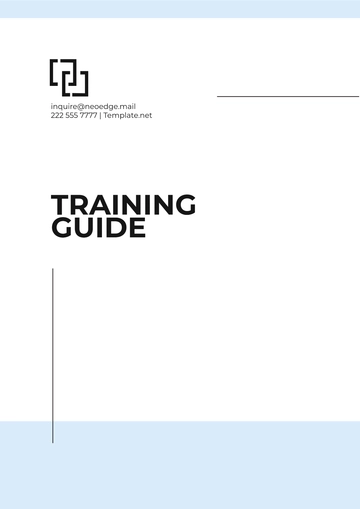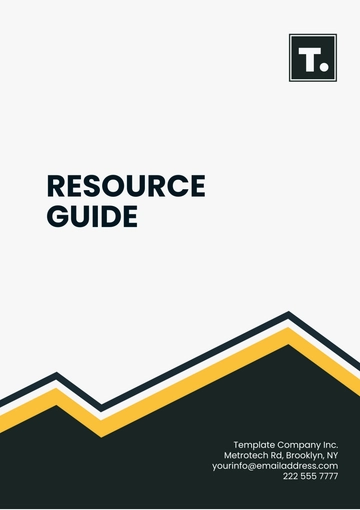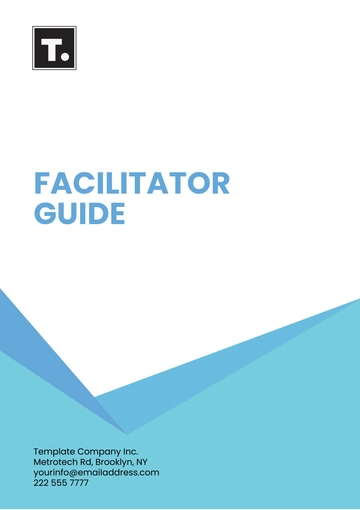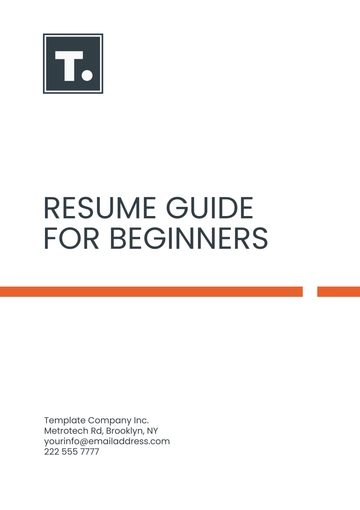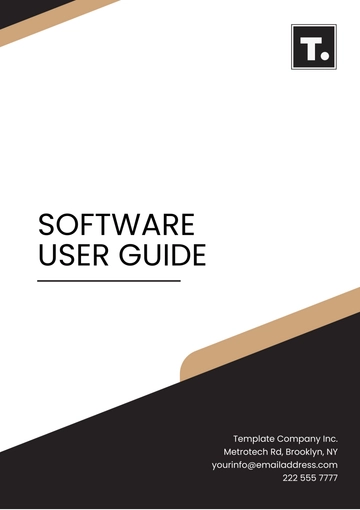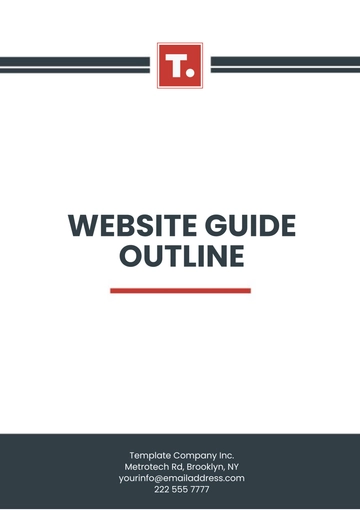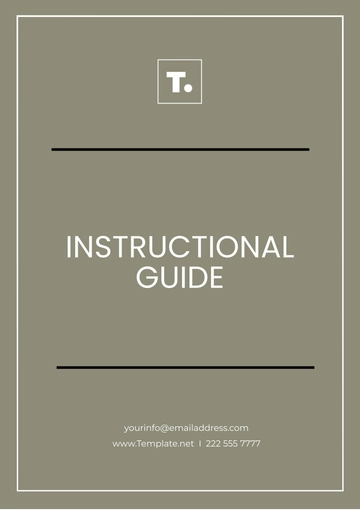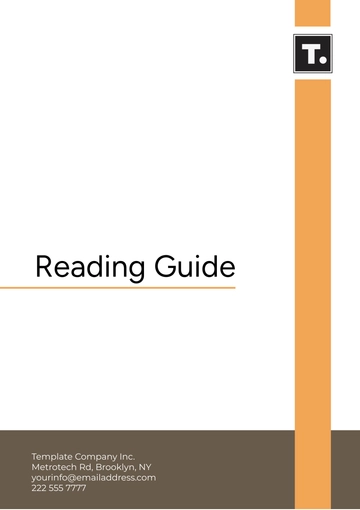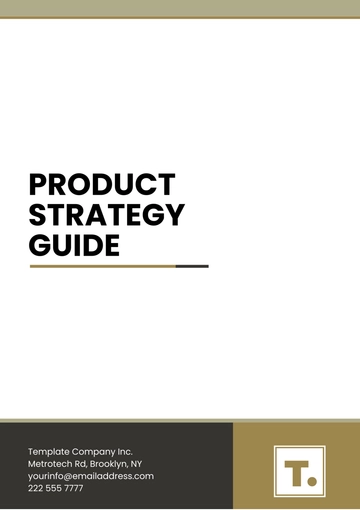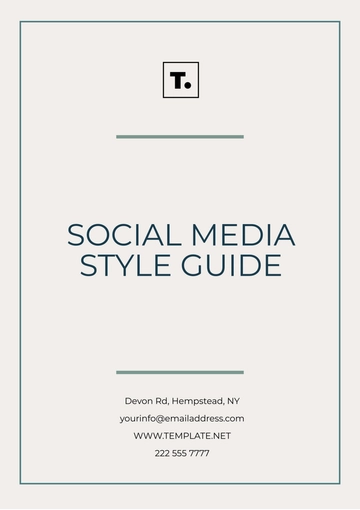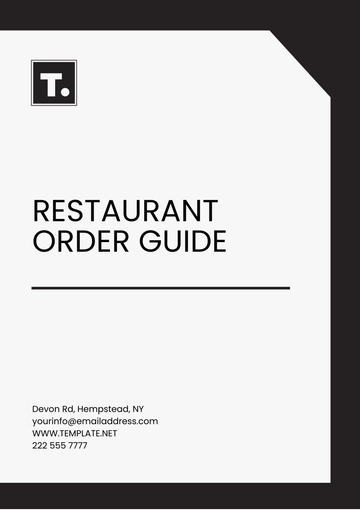Free School Student Success Guide
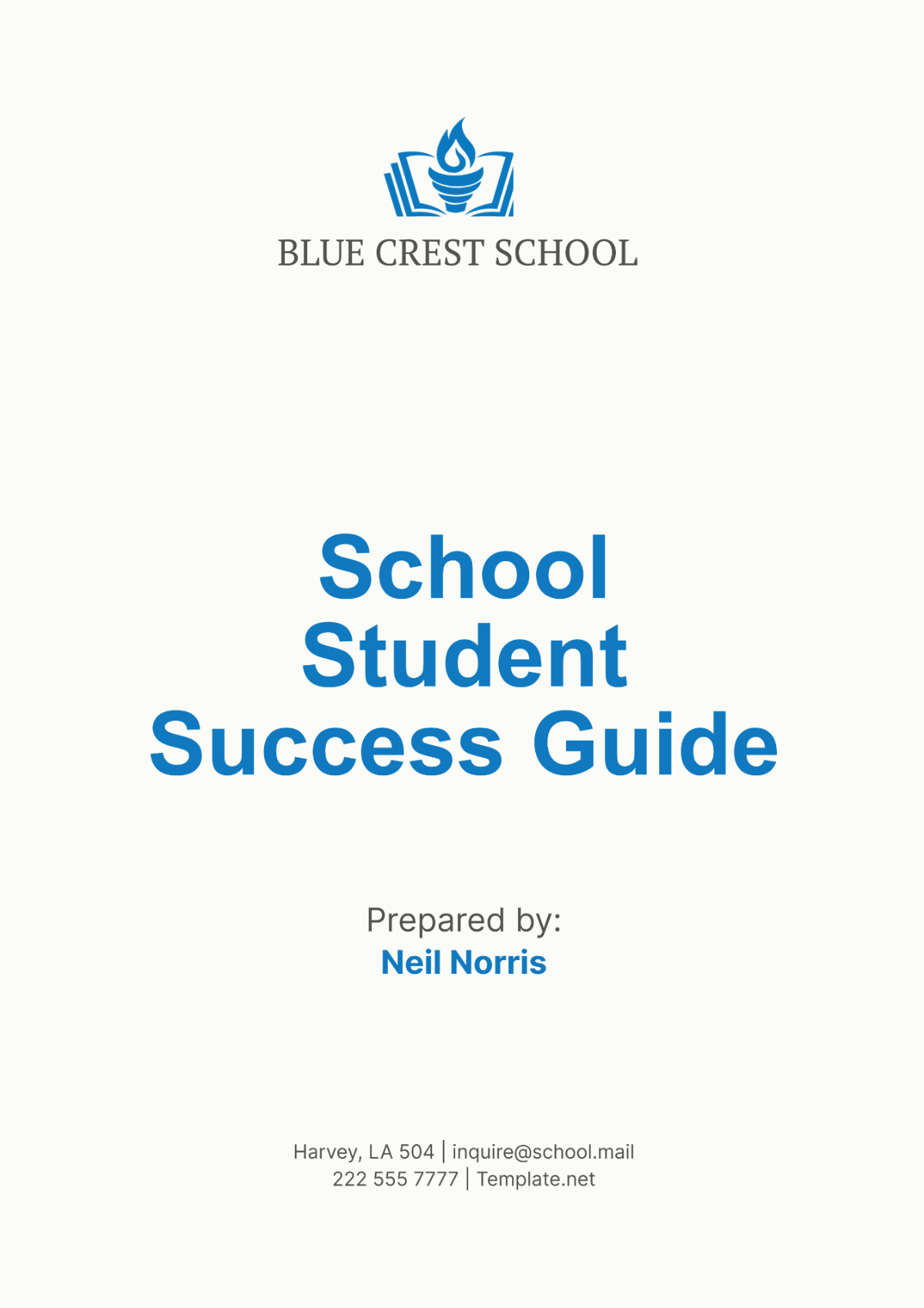
I. Introduction
A. Purpose
Encourage Achievement: The guide aims to encourage student achievement by providing essential resources and strategies. Achievement is fostered through clear guidelines and support.
Support Holistic Development: The guide supports the holistic development of students, addressing academic, social, and emotional needs. Holistic development ensures well-rounded and successful students.
Promote Best Practices: Promote best practices in studying, time management, and personal growth. Best practices help students develop effective habits for long-term success.
B. Scope
Comprehensive Coverage: This guide covers various aspects of student life, including academics, extracurricular activities, and personal well-being. Comprehensive coverage ensures all areas of student success are addressed.
Applicable to All Levels: The guidelines are applicable to students at all grade levels at [Your Company Name]. This ensures that every student can benefit from the advice and resources provided.
Resource for Families and Educators: The guide also serves as a resource for families and educators to support student success. Involving families and educators enhances the support system for students.
C. Target Audience
Students: The primary audience is students of [Your Company Name] who seek to improve their academic performance and personal growth. Directing the guide towards students ensures it meets their specific needs.
Parents and Guardians: Parents and guardians who want to support their children’s success can also benefit from this guide. Parental involvement is crucial for student achievement.
Teachers and Counselors: Educators and school counselors can use the guide to support their students effectively. Providing resources for teachers and counselors enhances their ability to help students succeed.
II. Academic Success Strategies
A. Study Techniques
Active Learning: Engage in active learning methods such as summarizing information and teaching it to others. Active learning enhances understanding and retention of material.
Scheduled Study Sessions: Schedule regular study sessions to avoid cramming. Consistent study habits improve long-term retention and reduce stress.
Utilize Resources: Use available resources like textbooks, online materials, and study groups. Utilizing various resources ensures a comprehensive understanding of the subject matter.
B. Time Management
Prioritize Tasks: Identify and prioritize tasks based on deadlines and importance. Prioritizing tasks helps manage time effectively and reduces procrastination.
Use a Planner: Keep a planner to track assignments, exams, and activities. A planner helps organize time and ensures that important tasks are not forgotten.
Break Tasks into Steps: Break large tasks into smaller, manageable steps. Breaking tasks down makes them less overwhelming and easier to complete.
C. Goal Setting
Set SMART Goals: Set Specific, Measurable, Achievable, Relevant, and Time-bound (SMART) goals. SMART goals provide clear direction and are easier to achieve.
Short-term and Long-term Goals: Balance short-term and long-term goals to stay motivated and on track. Having both types of goals ensures continuous progress.
Review and Adjust Goals: Regularly review and adjust goals as needed. Reviewing goals helps track progress and make necessary adjustments.
D. Test Preparation
Understand the Format: Familiarize yourself with the test format and types of questions. Understanding the format reduces anxiety and improves performance.
Practice Regularly: Regularly practice with past papers and sample questions. Practice helps identify areas of improvement and build confidence.
Seek Help: Don’t hesitate to seek help from teachers or peers if you encounter difficulties. Seeking help ensures that you understand the material thoroughly.
III. Personal Development
A. Self-Care
Healthy Lifestyle: Maintain a healthy lifestyle with a balanced diet, regular exercise, and adequate sleep. A healthy lifestyle enhances overall well-being and academic performance.
Mindfulness and Relaxation: Practice mindfulness and relaxation techniques to manage stress. Mindfulness improves focus and reduces anxiety.
Seek Support: Seek support from friends, family, or counselors when needed. Support systems provide emotional strength and guidance.
B. Extracurricular Activities
Join Clubs: Participate in school clubs and organizations that interest you. Joining clubs enhances social skills and provides a sense of community.
Volunteer: Engage in volunteer activities to develop empathy and social responsibility. Volunteering builds character and enriches personal growth.
Balance Activities: Balance extracurricular activities with academic responsibilities. Balancing activities ensures that neither academics nor personal interests are neglected.
C. Social Skills
Effective Communication: Develop effective communication skills for interacting with peers and teachers. Effective communication is essential for building relationships and resolving conflicts.
Collaboration: Learn to collaborate and work well in team settings. Collaboration enhances problem-solving skills and fosters teamwork.
Conflict Resolution: Practice conflict resolution skills to handle disagreements constructively. Resolving conflicts peacefully maintains healthy relationships.
IV. Utilizing School Resources
A. Library
Resource Availability: Utilize the library’s resources, including books, journals, and online databases. The library offers a wealth of information for academic success.
Study Spaces: Use the library’s study spaces for focused work. Study spaces provide a quiet environment conducive to concentration.
Librarian Assistance: Seek assistance from librarians for research and resource location. Librarians can provide valuable guidance and support.
B. Counseling Services
Academic Counseling: Access academic counseling for help with course selection and academic planning. Academic counselors can guide you towards achieving your educational goals.
Personal Counseling: Utilize personal counseling services for emotional and mental health support. Personal counseling helps address stress, anxiety, and other concerns.
Career Counseling: Seek career counseling to explore potential career paths and opportunities. Career counselors can help you make informed decisions about your future.
C. Technology
Computer Labs: Use the school’s computer labs for research and assignments. Computer labs provide access to necessary technology and software.
Online Resources: Take advantage of online educational resources and platforms. Online resources offer additional support and information.
Technical Support: Contact technical support for assistance with school-related technology issues. Technical support ensures that you can effectively use available technology.
V. Study Habits
The following table provides an overview of effective study habits.
No. | Habit | Description |
|---|---|---|
1 | Regular Review | Regularly review class notes and materials to reinforce learning. |
2 | Active Engagement | Engage actively with the material through discussion and practice. |
3 | Organized Workspace | Maintain an organized workspace free from distractions. |
4 | Use of Study Aids | Utilize study aids such as flashcards and summaries. |
5 | Group Study Sessions | Participate in group study sessions for collaborative learning. |
A. Regular Review
Daily Review: Review class notes and materials daily to reinforce learning. Daily reviews help retain information and prepare for upcoming lessons.
Weekly Summaries: Summarize weekly lessons to consolidate understanding. Summarizing helps identify key concepts and areas that need further review.
Pre-Exam Revision: Intensify review sessions before exams to ensure readiness. Pre-exam revisions enhance confidence and improve performance.
B. Active Engagement
Ask Questions: Actively ask questions in class to clarify doubts. Asking questions helps deepen understanding and engage with the material.
Participate in Discussions: Participate in class discussions to enhance learning. Discussions provide different perspectives and aid in comprehension.
Practice Problems: Solve practice problems regularly to apply concepts. Practicing problems reinforces learning and prepares for exams.
C. Organized Workspace
Declutter Regularly: Keep your study space clean and organized. A clutter-free space minimizes distractions and promotes focus.
Essential Supplies: Ensure that essential supplies like textbooks, notebooks, and stationery are readily available. Having supplies on hand reduces interruptions.
Comfortable Setup: Arrange a comfortable study setup with proper lighting and seating. A comfortable setup improves concentration and study efficiency.
D. Use of Study Aids
Flashcards: Create and use flashcards for quick review of key terms and concepts. Flashcards are a handy tool for memorization and quick recall.
Summaries: Write summaries of chapters and topics to solidify understanding. Summaries help condense information and highlight main points.
Mind Maps: Use mind maps to visually organize information. Mind maps provide a clear overview of connections between concepts.
E. Group Study Sessions
Form Study Groups: Form study groups with classmates for collaborative learning. Study groups provide support and different viewpoints on the material.
Assign Roles: Assign roles within the group, such as note-taker and discussion leader. Roles ensure that study sessions are productive and organized.
Regular Meetings: Schedule regular study group meetings to stay on track. Regular meetings help maintain momentum and accountability.
VI. Time Management Skills
A. Prioritizing Tasks
Task Importance: Identify tasks based on their importance and deadlines. Prioritizing tasks helps focus on what needs immediate attention.
To-Do Lists: Create to-do lists to organize and track tasks. To-do lists provide a clear outline of what needs to be accomplished.
Avoid Procrastination: Break tasks into smaller steps to avoid procrastination. Smaller steps make tasks seem more manageable and easier to start.
B. Creating a Schedule
The following table provides an overview of effective time management strategies:
No. | Strategy | Description |
|---|---|---|
1 | Daily Planner | Use a daily planner for time management. |
2 | Time Blocking | Block specific times for different activities. |
3 | Set Deadlines | Set realistic deadlines for completing tasks. |
4 | Limit Distractions | Minimize distractions to maintain focus. |
5 | Regular Breaks | Take regular breaks to avoid burnout. |
Daily Planner: Utilize a daily planner to keep track of assignments, deadlines, and activities. A daily planner helps organize your day and manage your time effectively.
Time Blocking: Block specific times for different activities to ensure a balanced schedule. Time blocking helps allocate dedicated time for studying, extracurriculars, and relaxation.
Set Deadlines: Set realistic deadlines for completing tasks and projects. Setting deadlines helps avoid last-minute stress and ensures timely completion of work.
Limit Distractions: Minimize distractions such as social media and noise to maintain focus. Limiting distractions enhances productivity and helps manage time better.
Regular Breaks: Take regular breaks to avoid burnout and maintain high levels of productivity. Regular breaks help rejuvenate your mind and body.
C. Avoiding Procrastination
Break Tasks into Steps: Divide tasks into smaller, manageable steps to make them less overwhelming. Breaking tasks down makes them easier to start and complete.
Set Small Goals: Set small, achievable goals to maintain motivation. Small goals provide a sense of accomplishment and encourage progress.
Use a Timer: Use a timer to work in focused intervals, such as the Pomodoro technique. Working in intervals with short breaks improves concentration and reduces procrastination.
Reward Yourself: Reward yourself after completing tasks to stay motivated. Rewards provide positive reinforcement and encourage continued effort.
D. Balancing Responsibilities
Academic Commitments: Prioritize academic commitments and ensure they are completed on time. Balancing academics with other responsibilities is crucial for success.
Extracurricular Activities: Participate in extracurricular activities without neglecting academic responsibilities. Balancing extracurriculars with academics promotes well-rounded development.
Personal Time: Allocate time for personal interests and relaxation to maintain a healthy balance. Personal time is essential for mental and emotional well-being.
VII. Utilizing Technology
A. Educational Tools
Learning Management Systems: Use learning management systems (LMS) like Moodle or Canvas to access course materials and assignments. LMS platforms provide a centralized location for academic resources.
Educational Apps: Utilize educational apps for additional practice and learning. Educational apps offer interactive and engaging ways to reinforce concepts.
Online Tutorials: Watch online tutorials to supplement classroom learning. Online tutorials provide visual explanations and step-by-step guides.
B. Digital Organization
Digital Planners: Use digital planners to organize tasks and set reminders. Digital planners are convenient and easily accessible.
Cloud Storage: Store important documents and assignments in cloud storage for easy access. Cloud storage ensures that your work is safe and accessible from anywhere.
Note-Taking Apps: Use note-taking apps to keep your notes organized and searchable. Note-taking apps enhance organization and make studying more efficient.
C. Cybersecurity
Strong Passwords: Use strong, unique passwords for all accounts to enhance security. Strong passwords protect against unauthorized access.
Regular Updates: Regularly update software and apps to the latest versions to ensure security. Updates often include important security patches.
Secure Networks: Use secure networks and avoid public Wi-Fi for sensitive tasks to protect your data. Secure networks provide a safer online environment.
Data Backup: Regularly back up important data to prevent loss in case of technical issues. Data backups ensure that you don’t lose valuable information.
Phishing Awareness: Be aware of phishing scams and avoid clicking on suspicious links or providing personal information. Phishing awareness helps protect against fraud and identity theft.
VIII. Health and Wellness
A. Physical Health
Balanced Diet: Maintain a balanced diet rich in nutrients to support physical health. A balanced diet provides energy and promotes overall well-being.
Regular Exercise: Engage in regular physical activity to stay fit and healthy. Regular exercise improves physical and mental health.
Adequate Sleep: Ensure you get adequate sleep each night to support learning and overall health. Adequate sleep is essential for cognitive function and well-being.
B. Mental Health
Stress Management: Practice stress management techniques such as deep breathing and meditation. Stress management helps maintain mental health and focus.
Seek Help: Seek help from counselors or mental health professionals if needed. Professional support can provide valuable guidance and assistance.
Mindfulness Practices: Engage in mindfulness practices to enhance focus and reduce anxiety. Mindfulness improves mental clarity and emotional balance.
C. Social Well-being
Healthy Relationships: Build and maintain healthy relationships with peers and teachers. Healthy relationships provide support and a sense of belonging.
Community Involvement: Participate in community activities to develop a sense of social responsibility. Community involvement fosters empathy and social skills.
Conflict Resolution: Practice conflict resolution skills to handle disagreements constructively. Resolving conflicts peacefully maintains healthy relationships.
IX. Frequently Asked Questions (FAQs)
Q: How can I improve my study habits?
A: Regularly review notes, engage actively with the material, and use study aids like flashcards and summaries. These strategies help reinforce learning and make it easier to recall information during exams.
Q: What are some effective time management strategies?
A: Use a daily planner to organize tasks, prioritize them based on importance and deadlines, and take regular breaks to avoid burnout. Effective time management ensures that all responsibilities are met without unnecessary stress.
Q: How can I balance academics with extracurricular activities?
A: Prioritize academic commitments, schedule specific times for extracurricular activities, and ensure you have personal time for relaxation. Balancing these aspects promotes a well-rounded development.
Q: What resources are available for academic support?
A: Utilize the library, counseling services, and technology resources like computer labs and online educational platforms. These resources provide comprehensive support to enhance your learning experience.
Q: How can I manage stress effectively?
A: Practice mindfulness, engage in regular physical activity, and seek support from friends, family, or counselors. Managing stress is essential for maintaining mental and emotional health.
Q: What are some tips for preparing for exams?
A: Understand the test format, practice with past papers, and seek help if you encounter difficulties. Being well-prepared reduces anxiety and improves performance.
Q: How can I maintain a healthy lifestyle as a student?
A: Eat a balanced diet, exercise regularly, and ensure you get adequate sleep each night. A healthy lifestyle supports both physical and mental well-being.
Q: How can I improve my social skills?
A: Develop effective communication skills, learn to collaborate in team settings, and practice conflict resolution. Strong social skills are crucial for building positive relationships.
Q: What should I do if I need help with technology issues?
A: Contact technical support for assistance with school-related technology issues and utilize online resources for additional support. Ensuring you have the technical help you need is important for staying on top of your studies.
Q: How can I set achievable goals?
A: Set SMART goals (Specific, Measurable, Achievable, Relevant, and Time-bound) and regularly review and adjust them as needed. Setting clear, attainable goals helps you stay focused and motivated.
- 100% Customizable, free editor
- Access 1 Million+ Templates, photo’s & graphics
- Download or share as a template
- Click and replace photos, graphics, text, backgrounds
- Resize, crop, AI write & more
- Access advanced editor
Empower students with the School Student Success Guide Template! Available on Template.net, this guide is fully customizable to meet the unique needs of each student. Its editable format allows for personalized advice and strategies. Utilize the advanced AI Editor Tool to ensure the guide is tailored to your school’s standards!






